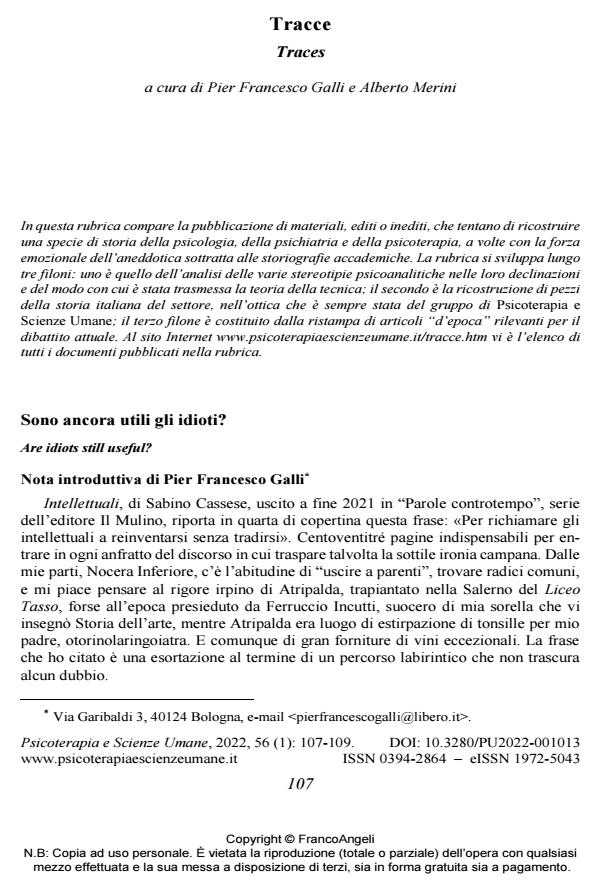Psychoanalysis and power: Introduction to the discussion
Journal title PSICOTERAPIA E SCIENZE UMANE
Author/s Pier Francesco Galli, Alberto Merini, Paul Parin, Goldy Parin-Matthèy
Publishing Year 2022 Issue 2022/1
Language Italian Pages 12 P. 107-118 File size 295 KB
DOI 10.3280/PU2022-001013
DOI is like a bar code for intellectual property: to have more infomation
click here
Below, you can see the article first page
If you want to buy this article in PDF format, you can do it, following the instructions to buy download credits

FrancoAngeli is member of Publishers International Linking Association, Inc (PILA), a not-for-profit association which run the CrossRef service enabling links to and from online scholarly content.
Some psychoanalytic considerations on power relationships are made. In particular, the following aspects are discussed: the frequent lack of awareness on power dynamics, the theoretical and practical obstacles to a psychoanalytic understanding of power relations, the differences between patients coming from high or low social classes within the psychoanalytic treatment, and the power dynamics that may occur between analyst and patient, with the influence also of psychoanalytic institutions. This paper was read as introduction to the Third Meeting of the "International Psychoanalytic Network" (Internationale Psychoanalytische Vernetzung) entitled "Are idiots still useful?", held at the Palazzo delle Stelline, Milan, Italy, June 3-4, 1988.
Keywords: Power; Psy-choanalysis and power dynamics; Submission; Master/slave dialectic; Applied psychoanalysis
- Adorno T.W., Frenkel-Brunswik E., Levinson D.J. & Sanford R.N. (1950). The Authoritarian Personality. New York: Harper (trad. it.: La personalità autoritaria. Introduzione di Giovanni Jervis. Milano: Edizioni di Comunità, 1953, 1973).
- Erdheim M. (1988). Die Psychoanalyse und das Unbewußte in der Kultur. Frankfurt a.M.: Suhrkamp.
- Freud S. (1921). Psicologia delle masse e analisi dell’Io. Opere, 9: 259-330. Torino: Boringhieri, 1977.
- Gualandri E. & Schweizer K. (1984). La risposta al cambiamento. Psicoterapia e Scienze Umane, XVIII, 2: 48-62 (Relazione di tenuta il 4 febbraio 1984 al “Seminario Psicoanalitico di Zurigo” [Psychoanalytisches Seminar Zürich]).
- Hegel G.W.F. (1807). Phänomenologie des Geistes. Bamberg/Würzburg: Joseph Anton Goebhardt (trad. it.: Fenomenologia dello spirito. Firenze: La Nuova Italia, 1933; Torino: Einaudi, 2008)
- Loewenstein R.M. (1954). Some remarks on defences, autonomous ego and psycho-analytic technique. International Journal of Psychoanalysis, 35, 2: 188-193.
- Machiavelli N. (1532). Il Principe. Firenze: Sansoni, 1899; Torino: Einaudi, 2006.
- Parin P. (1972). Der Ausgang des ödipalen Konflikts in drei verschiedenen Kulturen. Eine Anwendung der Psychoanalyse als Sozialwissenschaft. Kursbuch, 29: 179-201 (http://paul-parin.info/wp-content/uploads/texte/deutsch/1972b.pdf) (trad. it.: L’esito del conflitto edipico in tre diverse società. Un’applicazione della psicoanalisi come scienza sociale. Psicoterapia e Scienze Umane, 1973, VII, 1/2: 1-10).
- Parin P. (1974). Gesellschaftskritik im Deutungsprozess. Psyche, 1975, 29, 2: 97-117 (http://paul-parin.info/wp-content/uploads/texte/deutsch/1975a.pdf) (Conferenza tenuta alla inaugurazione del Michael-Balint-Institute di Amburgo, 2 febbraio 1974) (trad. it: Critica della società nel processo di interpretazione. Psicoterapia e Scienze Umane, 1976, X, 1/2: 1-9. Ristampa: Psicoterapia e Scienze Umane, 2009, XLIII, 3: 235-248. DOI: 10.3280/PU2009-003005)
- Parin P., Morgenthaler F. & Parin-Matthèy G. (1971). Fürchte deinen Nächsten wie dichselbst. Psychoanalyse und Gesellschaft am Modell der Agni in Westafrika. Frankfurt a.M.: Suhrkamp -- (http://paul-parin.info/wp-content/uploads/texte/deutsch/1971a.pdf) (trad. it.: Temi il prossimo tuo come te stesso. Psicoanalisi e società: il modello degli Agni nell’Africa occidentale. Milano: Feltrinelli, 1982).
- Alcune pubblicazioni di Pier Francesco Galli elencate in ordine cronologico A cura della Redazione, in PSICOTERAPIA E SCIENZE UMANE 3/2024 pp.419
DOI: 10.3280/PU2024-003003
Pier Francesco Galli, Alberto Merini, Paul Parin, Goldy Parin-Matthèy, Sono ancora utili gli idioti? / Psicoanalisi e potere: Introduzione alla discussione in "PSICOTERAPIA E SCIENZE UMANE" 1/2022, pp 107-118, DOI: 10.3280/PU2022-001013